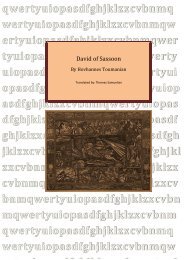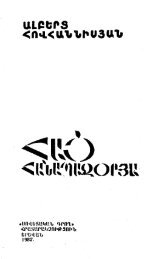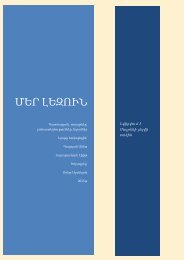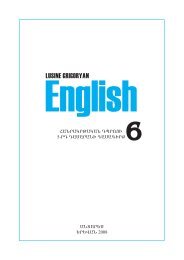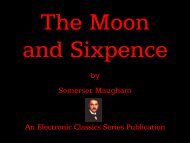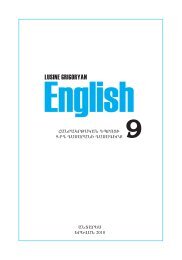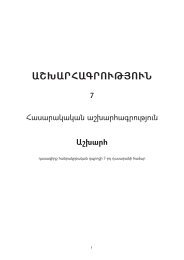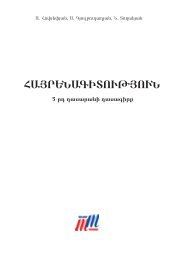Focus on Words
Focus on Words
Focus on Words
You also want an ePaper? Increase the reach of your titles
YUMPU automatically turns print PDFs into web optimized ePapers that Google loves.
Since ancient times writers, poets, orators have created a great amount of<br />
metaphors, some of which have become well-known while others remained <strong>on</strong> the<br />
pages of books. Those metaphors or tropes, that after a definite period of time become<br />
well-recognizable and fixed in the dicti<strong>on</strong>aries are called language metaphors, e.g.<br />
She is the apple of the eye.<br />
There are also speech metaphors which are fresh, establish striking associati<strong>on</strong>s<br />
between two phenomena. They are always quite individual.<br />
In the following lines the poets and writers create images based <strong>on</strong> similarities:<br />
Morning is<br />
a new sheet of paper<br />
for you to write <strong>on</strong>.<br />
(Eve Merriam)<br />
There is a kind of metaphor called pers<strong>on</strong>ificati<strong>on</strong> in which human characteristics<br />
are given to a n<strong>on</strong>-human force of object. It is widely used in poetry and prose, e.g.<br />
I bring fresh showers for the thirsting fl owers,<br />
From the seas and the streams.<br />
(P. B. Shelley)<br />
Very often in order to characterize somebody or something the speaker uses such<br />
say ings as<br />
Free as a bird<br />
Dead as a doornail<br />
They are language similes.<br />
Simile, like metaphor helps readers visualize ideas <strong>on</strong> the principle of similarity<br />
but it includes the words “like” or “as”.<br />
Similes are comm<strong>on</strong> in everyday speech and some are used so often that they<br />
become lifeless:<br />
George shook like a leaf in a storm.<br />
Simile differs from mere comparis<strong>on</strong> as e.g. “He is clever as his father”, because<br />
in the comparis<strong>on</strong> two c<strong>on</strong>cepts/things compared bel<strong>on</strong>g to the same class.<br />
The difference between simile and metaphor leads some scholars to the belief that<br />
metaphor is more emoti<strong>on</strong>al and more expressive.<br />
Do you know what is the difference between “greenyears” and “green trees”?<br />
The first is a poetic epithet and the sec<strong>on</strong>d is a simple attribute. The former creates<br />
an image while the latter indicates <strong>on</strong>e of the properties of the thing spoken about.<br />
Epithet expresses a characteristic of an object, both existing and imaginary,<br />
e.g. The glow of an angry sunset.<br />
Its basic feature is its emotiveness and subjectivity as its unusual characteristic of<br />
the object.<br />
In the majority of examples epithet is expressed by adjectives or qualitative<br />
adverbs (e.g. sleepless bay, triumphant look), modifying nouns or verbs.<br />
inverted epithet - devil of a woman (a devilish woman), giant of a man (a gigan tic<br />
man). Epithets can also be metaphorical, as “the ir<strong>on</strong> hate”, “a tobacco-stained<br />
smile”.” Oh!He is my dear enemy”<br />
133





